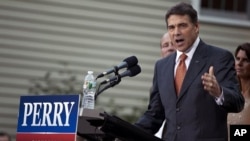In U.S. presidential politics, President Barack Obama’s foreign policy record has come under attack from Republican presidential contenders in recent days.
A common theme is developing among the Republican presidential contenders that the United States is weaker and more cautious under President Obama’s leadership.
Texas Governor Rick Perry spoke to a Veterans of Foreign Wars convention in his home state. “As the 10th anniversary of the attacks of 9-11 approach, we must renew our commitment to taking the fight to the enemy, wherever they are, before they strike at home,” he said.
Perry has only been in the race a few weeks but has already jumped to the top of most opinion polls among the Republican contenders.
Perry’s rise has come at the expense of former Massachusetts governor Mitt Romney, who had led in the polls for months.
Romney also spoke to the veterans group in Texas and said that President Obama has presided over what he called a muddled foreign policy. “We can’t lead the world by hoping our enemies will hate us less," he stated. "America must lead with clarity of intent, a commitment of purpose and unlimited resolve.”
Minnesota Congresswoman Michele Bachmann emphasized leadership during a speech to the American Legion convention in Minneapolis, including a comparison to former British Prime Minister Margaret Thatcher. “Both Ronald Reagan and Margaret Thatcher contributed mightily to restoring the economic and military greatness of the nation during their respective time periods," she stated. "We are in a similar time period and we need to have strong, viable leadership to see that return again today.”
While the Republican candidates criticize Obama's foreign policy, they have given few details about what they would do differently in handling the country's international relationships or its defense.
President Obama also spoke to the American Legion in Minnesota and offered details about his policy. He pointed to success in Afghanistan, noted the recent killing of al-Qaida leader Osama bin Laden and highlighted the administration’s support for the NATO effort in Libya.
“Having put al-Qaida on the path to defeat, we won’t relent until the job is done. Having started to draw down our forces in Afghanistan, we will bring home 33,000 troops by next summer and bring home more troops in the coming years,” Obama explained.
For the most part, though, political experts say that foreign policy remains only a diversion from the main issues of economic growth and jobs.
Tom DeFrank is Washington bureau chief for the New York Daily News and is a regular commentator on VOA’s Issues in the News program. “The average American is still going to be focused on jobs, the economy, getting back to work, unemployment. And clear successes like the Libyan campaign for President Obama will be very much subordinated,” he said.
The latest Associated Press GfK poll found strong support for President Obama’s approach on fighting terrorism and beginning the drawdown of U.S. troops in Afghanistan. Overall, the president’s approval ratings on foreign policy issues are far higher than his handling of the domestic economy and especially job creation.




